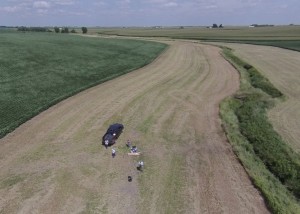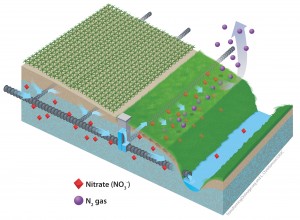** Access a 2-page saturated buffer factsheet here. **
Innovating through barriers for bioreactors and saturated buffers
 The overarching goals of this multi-state USDA NRCS Conservation Innovation Grant project are to apply innovative design, assessment, and monitoring techniques to clean more N from tile drainage water leading to accelerated denitrifying woodchip bioreactor and saturated buffer adoption across the US Midwest. Three proposed objectives will allow: bioreactors and saturated buffers to treat more water, more effectively in field demonstrations; systematic analysis of existing adoption-scaling limitations for these two practices across Iowa, Illinois, and Minnesota; and evaluation of novel monitoring methods that could lead to market-based water quality solutions.
The overarching goals of this multi-state USDA NRCS Conservation Innovation Grant project are to apply innovative design, assessment, and monitoring techniques to clean more N from tile drainage water leading to accelerated denitrifying woodchip bioreactor and saturated buffer adoption across the US Midwest. Three proposed objectives will allow: bioreactors and saturated buffers to treat more water, more effectively in field demonstrations; systematic analysis of existing adoption-scaling limitations for these two practices across Iowa, Illinois, and Minnesota; and evaluation of novel monitoring methods that could lead to market-based water quality solutions.
Funding Partner: USDA Natural Resources Conservation Service
Co-PIs: R. Christianson, R. Cooke, M. Helmers, M. Soupir, T. Isenhart, C. Hay, L. Abendroth, G. Chighladze, L. Pease, G. Feyereisen, and J. Kjaersgaard (L. Christianson, Lead PI)
Drainage water management and saturated buffers for achieving Illinois Nutrient Loss Reduction Strategy goals
Agricultural producers farming the 9.7 million acres of tile-drained land in Illinois need a wide variety of proven options to reduce nitrogen loss. Two practices that may reduce tile drainage N loss, but are not in the Illinois Nutrient Loss Reduction Strategy, are drainage water management (or, controlled drainage) and saturated buffers. The goal of this work is to evaluate N loss reduction provided by these two practices to assess their potential inclusion as recommended practices in Illinois.
Funding Partner: Illinois Nutrient Research and Education Council
Co-PIs: Drs. Richard Cooke and Paul Davidson, Biological & Agricultural Engineering, University of Illinois (L. Christianson, Lead PI)
Balancing water quality and nutrient management goals for the sustainable intensification of corn systems (continuation: 2021-2023)
 The Illinois Nutrient Loss Reduction Strategy provides guidance on suggested conservation practices to improve agricultural water quality, but there is limited scientific evidence on the effectiveness of these practices when implemented in combination in Illinois corn production systems. We have established a sustainable intensification research site at the University of Illinois Dudley Smith Farm with the aim of evaluating the combined effects of water quality practices on tile drainage nutrient losses, nutrient use efficiencies, and crop yields.
The Illinois Nutrient Loss Reduction Strategy provides guidance on suggested conservation practices to improve agricultural water quality, but there is limited scientific evidence on the effectiveness of these practices when implemented in combination in Illinois corn production systems. We have established a sustainable intensification research site at the University of Illinois Dudley Smith Farm with the aim of evaluating the combined effects of water quality practices on tile drainage nutrient losses, nutrient use efficiencies, and crop yields.